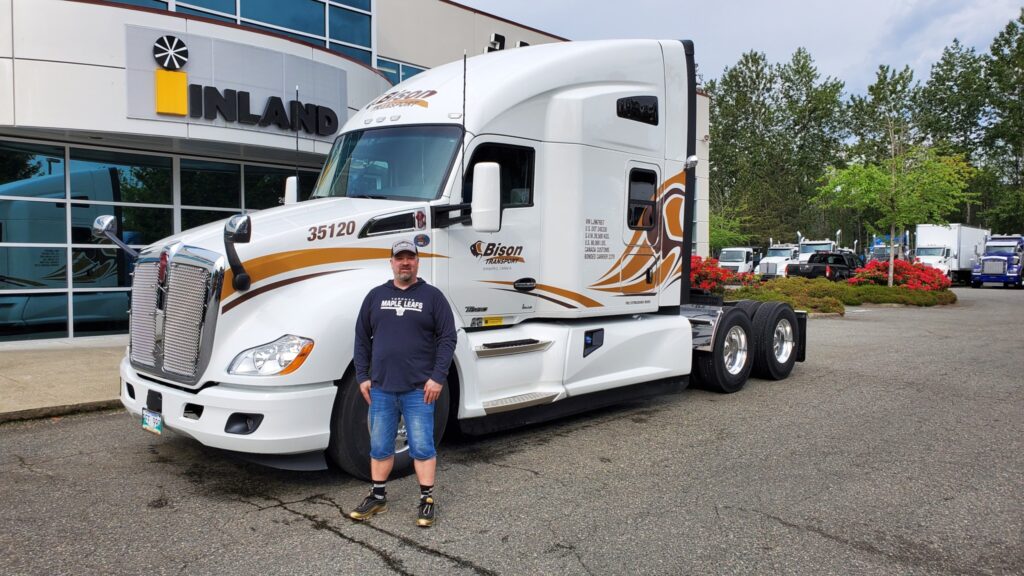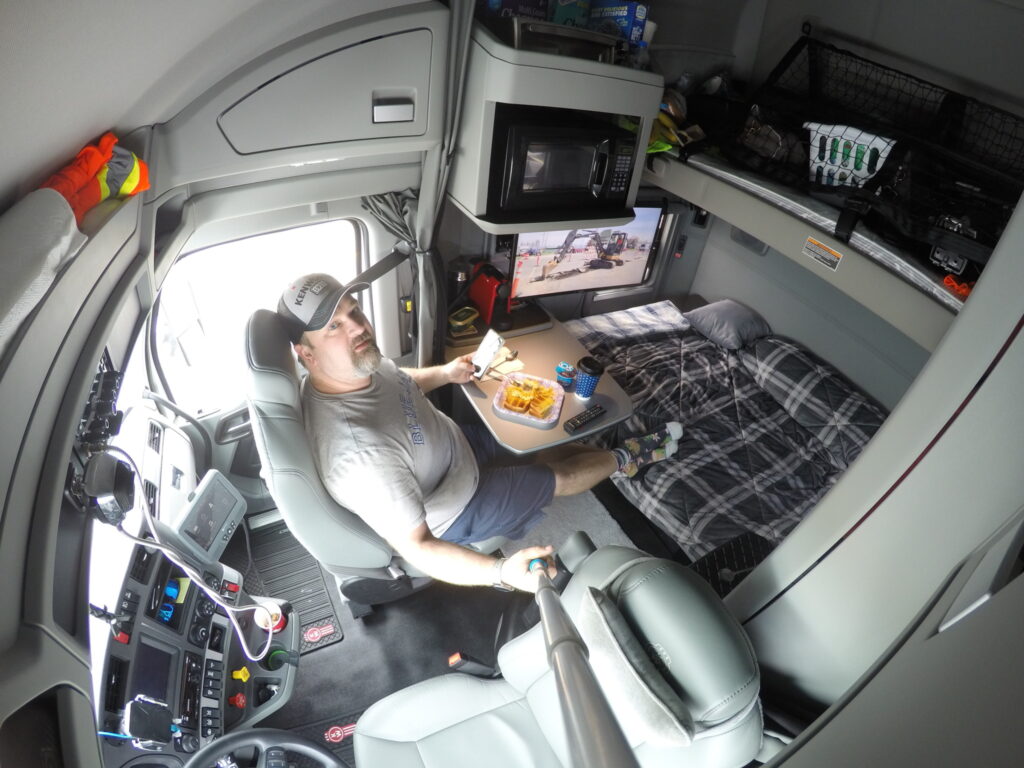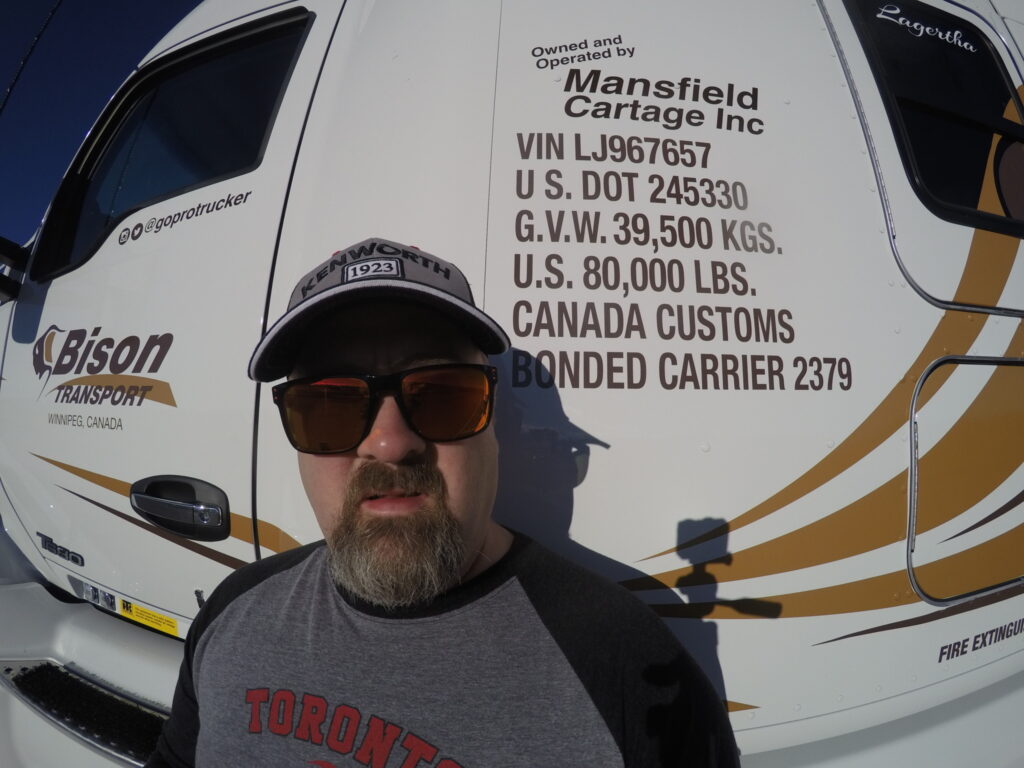Becoming an owner-operator in the age of Covid-19
TORONTO, Ont. – When Roger Mansfield turned 40 last year, he decided the time was right to pursue his dream of becoming an owner-operator.
In January, he got the ball rolling, incorporating his business, doing a business name search, and assembling the paperwork. He was ready to launch his career as an owner-operator this Spring. Then Covid-19 hit.
“When the pandemic hit in March, I already had one foot in the door,” Mansfield told Today’s Trucking. “When the shutdown became official, I was literally just about to buy the truck. I was ready to go. I decided to put it off for about three weeks, just to see where freight volumes were going.”
After putting his dream on hold for a few weeks, Mansfield decided to take the plunge. The Bison Transport company driver was planning to lease on with the same company, and was assured freight would be steady due to its diverse freight network.

“It’s a strange time to buy a truck,” Mansfield admitted while doing a reset in his Kenworth T-680. “A lot of people can’t believe I did that.”
But it can also be a good time to buy a truck. All truck manufacturers are offering attractive incentives to kickstart sales. They range from deferred initial payments, to reduced costs on extended warranty packages, to relaxed down payment requirements. Postponing his truck purchase allowed Mansfield to tap into some of those incentives.
“When I bought it was the end of May and it was definitely a buyer’s market,” he said. “A lot of (OEMs) are offering cash-back incentives, down payment allowances, free chassis warranty – all of them have some sort of deferral on the first payment to give you a little cushion there.”
Dealers are also sitting on a backlog of 2020 model year trucks they are eager to move to make way for 2021 models. Mansfield opted for a 2020 T-680, still brand new, “so it’s definitely an opportunity to get a really good deal, which is important because over the last couple years it’s been really difficult to buy a truck outright just because of the Canadian dollar.”
Mansfield leased on with Bison, a company he was already familiar with having worked for them as a company driver. But for those looking to strike out under their own authority, the path is much more difficult. Most insurance providers now refuse to take on new operations. This can be a rude awakening for aspiring busines owners.
The insurance trap
“If they really want to start their own business, they need to be an owner-operator contracted to a fleet (to get insurance),” warned Rod Stiller, president of broker National Truck League. “That’s the unfortunate news. I know it doesn’t go along with the entrepreneurial spirit but most of the insurance companies that will write a new venture want to see they’ve been incorporated for three years, have had their CVOR for a few years, that they had some kind of fleet experience with the same equipment configuration and radius.”
Stiller’s advice to owner-operators who eventually want to operate independently, is to first lease on with a fleet that runs the same lanes and commodities.
“If someone runs three years in Canada as an owner-operator for a domestic fleet, it will not help them get insurance if they want to start crossing the border under their own authority,” he said. “It’s very difficult and it has been getting tighter and tighter over the last couple years.”
Some owner-operators may turn to facility insurance, a government-backed insurance of last resort, but Stiller said the premiums are generally too high to be feasible for a new venture.

“I have talked to owner-operators who say ‘Hey, I bought a truck, I’m ready to go,’ and we give them a facility quote and they can’t even make sense of that. We suggest they contract with a reputable fleet,” said Stiller.
Lisa Arseneau, commercial producer with Staebler Insurance, has also had to disappoint new owner-operators who purchased a truck only to find they couldn’t get insurance for their new venture. She too suggests they lease on with a reputable fleet.
She suggests asking a few questions of the fleet, including: Is the fleet policy deductible? Is the premium contributory by the fleet, or borne solely by the owner-op? Is deductible buy-down available? Does the fleet have a WSIB alternative insurance program?
Mansfield said the benefit of signing on with a fleet is the insurance is bundled with other fees, including: permitting; plates; fuel cards, etc., so it’s a steady, predictable single deduction. Also, signing with a safe fleet ensures the owner-operator gets the benefit of the lower premiums they’ve earned through their overall fleet safety performance.
“Their insurance costs are lower and they get kicked down to their owner-operators,” he noted. “I couldn’t imagine doing it on my own.”
Find the right fleet
Joanne Ritchie, executive director of the Owner-Operator Business Association of Canada, urged owner-operators to lease on with a carrier that will treat them as a valued business partner.
“I would say the prohibitive cost of insurance is probably the single biggest reason why the most common business model for owner-operators in Canada is to work under a carrier’s plates and insurance. All the more reason to have a rock-solid business contract with a carrier who sees the owner-operator as a business partner,” she said.
“I would never advise anyone to take the plunge until they’ve had a couple of years out on the road as a company driver under their belt.”
Joanne Ritchie, OBAC
She also urged prospective owner-ops to avoid the temptation of buying a new truck just because of attractive incentives currently on offer.
“I would never advise anyone to take the plunge until they’ve had a couple of years out on the road as a company driver under their belt,” she said. “They need to have a good understanding of how trucking works behind the wheel on a day-to-day basis. They also need to have good overall knowledge of the trucking industry – rates, capacity, etc. – especially in this climate. And a good knowledge of the economy in general and how trucking fits in is especially important if they are going to be starting up a small busines.”
A lack of business skills is one of the leading contributors to an owner-operator’s demise, Ritchie warned.
“Understanding their costs, then ensuring revenue covers these costs and leaves them a profit is the only way it will work,” she said.
For Mansfield, life on the road is different as an owner-operator. Instead of spending his resets watching Netflix, he’s updating his books and climbing under the truck with a grease gun. Owning the truck has also affected how he drives.
“It’s a different ballgame. You don’t realize how much differently you drive, how much more conservative you are with your own truck, how much you pay attention to fuel prices.” But, the fledgling owner-operator has no regrets about taking the plunge and starting his own business, even in the midst of a global pandemic. “So far, it has gone pretty smoothly,” he said.

Have your say
This is a moderated forum. Comments will no longer be published unless they are accompanied by a first and last name and a verifiable email address. (Today's Trucking will not publish or share the email address.) Profane language and content deemed to be libelous, racist, or threatening in nature will not be published under any circumstances.
-
Correct. Did you not read the accompanying report about insurance costs? Chances are that if you go out on your own, especially in dry van freight business you will fail and even if you do manage to hang on you will be living on less than minimum wage, after expenses. Freight rates are never high enough and they never will be. Thats the nature of the beast in dry van freight.
Brilliant advice – go in with your eyes wide open and be prepared to go to work to work!
Have a plan, do the math and keep your fingers crossed
Insurance companies in Ontario Canada are causing many small trucking,bus ,taxi, owner ops. To FAIL. I was camped out at Queen’s Park from January 24 to March 17 and will likely go back after the pandemic is over. The current government of Ontario is doing a terrible job to provide affordable insurance to many smaller transportation companies of all types. At the same time the larger trucking companies, nursing homes, private insurance companies and other well connected groups are making decisions that hurt poor little people.
with today market and in certitude you really have to know what you are doing, while a company driver they give you all the work they got but different a bit for owner op. Keep a good track of all your paperwork and good accounting. Good luck.
This is very impressive. I like to congratulate Roger for his move. I am currently in training to become a driver and Roger make me comfortable to fulfill my dream one day.
My plans are to become an Owner Operator once this Pandemic is over. The financial aspects seem rewarding and after 25 years of commercial truck driving experience I can’t see much problems besides the usually 1st quarter slow downs after new years. It’s all about balancing your budget & having that reserve. A 1/3rd split from Truck payments, reserve saving expense & personal payment is the key especially the upfront Contract Agreement with the carrier for a $1.60/mile minimum.
Rather misleading headline, he may own the truck but the operator is Bison, therefore like so many , not an owner operator